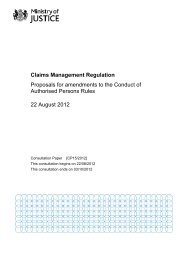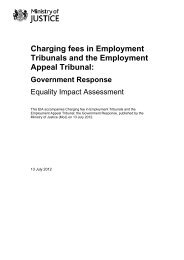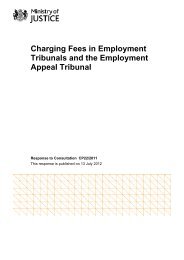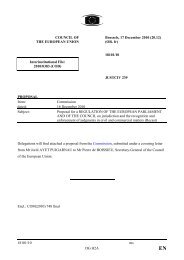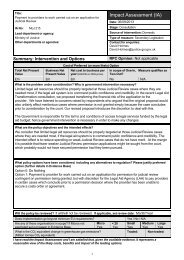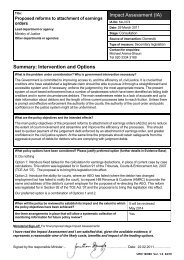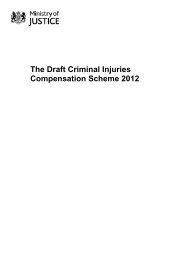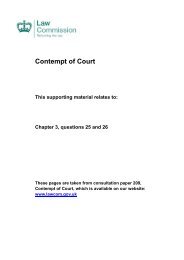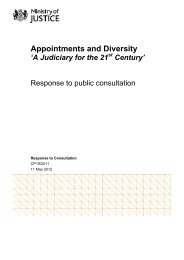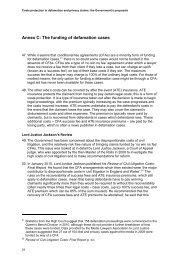Administrative Justice and Tribunals Council ... - Consultation Hub
Administrative Justice and Tribunals Council ... - Consultation Hub
Administrative Justice and Tribunals Council ... - Consultation Hub
Create successful ePaper yourself
Turn your PDF publications into a flip-book with our unique Google optimized e-Paper software.
is aware that evidence of good practice in the coroners system remains sporadic <strong>and</strong><br />
geographically inconsistent.<br />
Case study: An example of bad practice in the coroners system:<br />
Mark Cannon was a 30 year old man, who had a severe learning disability <strong>and</strong><br />
epilepsy. He had very little speech, but was able to communicate with his family <strong>and</strong><br />
sister, Jane, to whom he was very close.<br />
Mark lived at home with his mother <strong>and</strong> stepfather <strong>and</strong> attended a day centre, five<br />
days a week. He occasionally stayed at a care home run by his local authority.<br />
In June 2003, for reasons unknown, Mark broke his femur while staying at the care<br />
home. He was subsequently in <strong>and</strong> out of hospital. His condition continued to<br />
deteriorate <strong>and</strong> in the middle of August 2003, he had a heart attack while on the High<br />
Dependency Unit in Hospital. At the end of August 2003, his life support machine<br />
was switched off.<br />
The family believed Mark’s death was avoidable <strong>and</strong> an inquest decided that he died<br />
as a consequence of an “accidental death.” Mark’s family contested this view <strong>and</strong><br />
made complaints against the local authority concerned, his GP practice <strong>and</strong> the<br />
Healthcare Commission. None of these complaints were upheld.<br />
However, when the Parliamentary <strong>and</strong> Health Service Ombudsman (PHOS)<br />
investigated the family’s complaints they were upheld. The report said: “Mr Cannon’s<br />
parents said they were appalled by what happened to their son. At one point in the<br />
complaints process they said:<br />
“All of Mark’s 30 years had been a struggle for equal rights to health care, support<br />
<strong>and</strong> the services within the society he lived. We battled continuously with virtually no<br />
progress”.<br />
If Mark’s family had relied entirely upon the coroners service to establish the correct<br />
details as to the cause of their son’s death, they would still not be aware of the truth.<br />
The Death by indifference report raised some key failings of the coroners system as<br />
bereaved people are being let down, made to wait lengthy periods for decisions <strong>and</strong><br />
denied the answers they require to achieve the causes of a loved one’s death.<br />
Mencap believes that the Office of the Chief Coroner is vital in seeking to overcome<br />
these failings by ensuring that inquests are of an approved national st<strong>and</strong>ard <strong>and</strong><br />
that accountability for the findings of the inquest is achieved. This will help to bring<br />
about a coroners system which meets the needs of the bereaved <strong>and</strong> learns from the<br />
past in order to prevent similar incidents in the future.<br />
A more effective coroners system would be better placed to spread the lessons of<br />
failing practice, achieve higher st<strong>and</strong>ards <strong>and</strong> help prevent unnecessary deaths in<br />
www.mencap.org.uk<br />
Registered charity number 222377 Page 5 of 10



